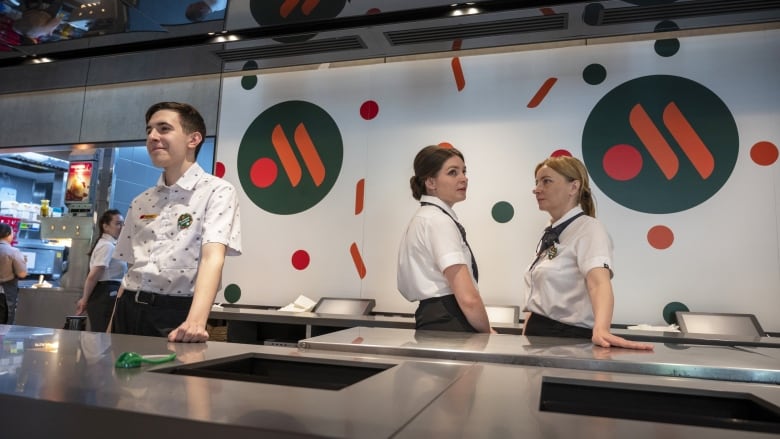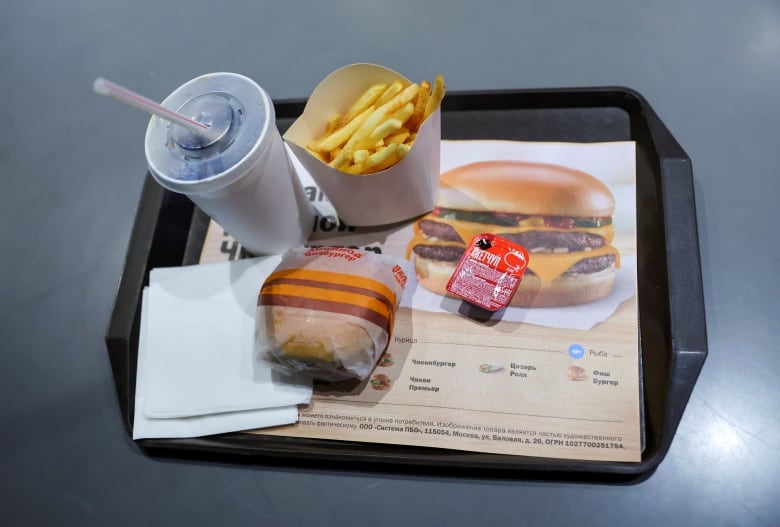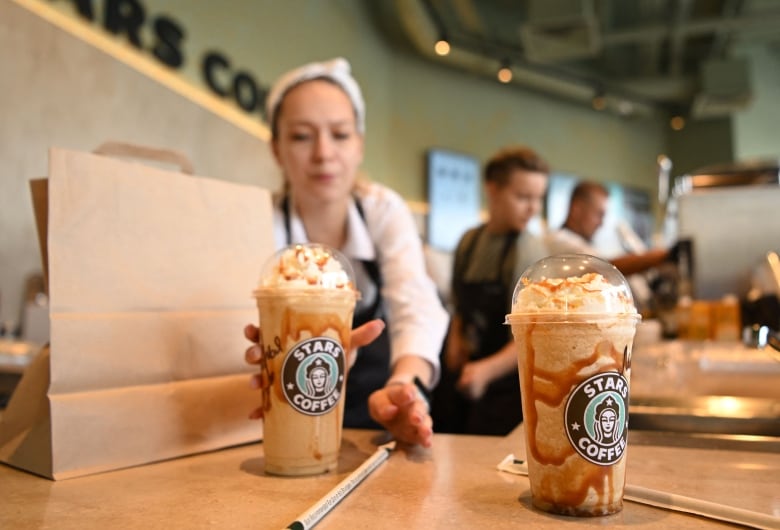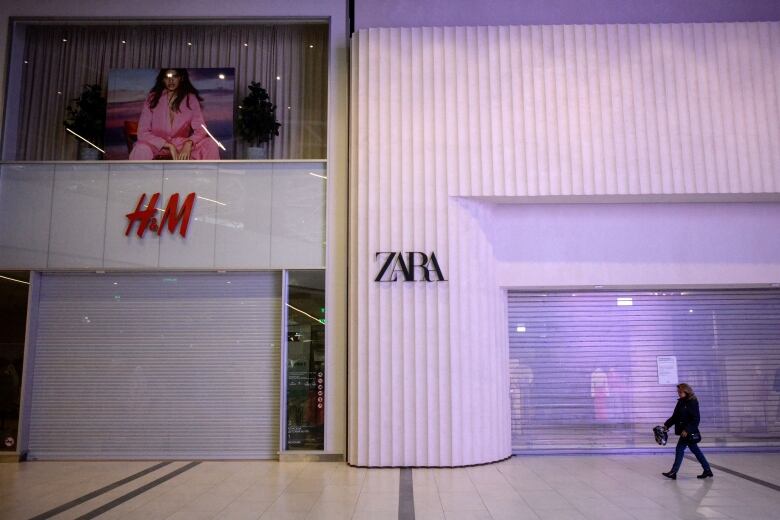Western brands still hold sway in Russia, even if copycats are taking their place
More than 1,000 foreign companies have curtailed business in Russia in wake of Ukraine invasion

The food is familiar, the brandless so.
Yet the Vkusno &tochka outlet in Moscow's Pushkin Square serves up burgers, just like during its golden arches days, according to reports from its opening.
It's not a McDonald's anymore because the burger giant left the Russian market in the wake of Moscow's invasion of Ukraine, endingathree-decades-long runthat beganin 1990.
"They were this big sort of symbol of the Soviet Union opening up to the West," said Kristy Ironside, an economic historian at McGill University, who is working on a book about the fast food company'sexperience in the Russian market.
Prior to going through what McDonald's called a "de-Arching process" in Russia, the chain had built a network of more than 800stores and employed more than 60,000 people there.
How long its made-in-Russia replacementwill last is unknown, but it's not the only brand clone vying to take advantage of a Westerncompetition vacuum.
- What questions do you have about Russia's invasion of Ukraine? Send an email toask@cbc.ca
Amid public and political pressures, more than 1,000 foreign companies have halted operations in Russia to varying degrees since the start of the Ukraine war, according to a database maintained by Yale University researchers.

ButRussia's tensions with the West have not diminished consumers' appetites for foreign products and services as evidenced by some of the copycat businessesthat have sprung up in the wake of their departure.
"Many of these Western brands represented a defiant position against the Russian product, against the Soviet era of repression," said Jeffrey Sonnenfeld, a Yale University management professor who has been chronicling the actions foreign companies have takenin reaction to the Ukraine war.
"So, buying the local good,it's going to be inferior and itdoesn't give any of the brand cachet."
A familiar look
In addition to thenot-quite-McDonald'srestaurants, there's anewly launchedtakeout coffeeproviderand soon-to-be-soldsoft drinkthat have made headlines for their similaritieswith prominent Western brand names. More big-name brand imitators may be emerging.

In the case of the Stars Coffee, the logo sharesoverlap with Starbucks' though the Russian venture'sco-owner told Reuters "apart from the circle, you won't find anything in common" between them.
No matter its branding, Sonnenfeld said thepeople buying coffee there won't be getting the same product.
"Itis a cheap, diluted knock-off that's not going to fool anybody especially a Russian consumer," he said.
Copycat efforts and brand encroachments may be general concerns for Western companies at all times, but Sonnenfeld said what's occurringin Russia may be harmful to the country's long-term business interests.
"If they show no regard for intellectual property, nobody is ever going to go back in," he said.
A short-term remedy
Sergei Guriev, an economics professor and provost atSciences Po in Paris, said these efforts show that Russia's economy can make adjustments and carry on, at least for now.
"While it's not easy to substitute Western technology, quality, managerial practicesand business models, in the short run, you can copy them and ... producea substitute," Guriev told CBC News, via an audio message.

"It's not surprising this is happening. How good these substitutes are well, they're not great, but they're viable in the short run."
Olga Kamenchuk, a research associate professor at Northwestern University's Institute for Policy Research, said polling conducted by the Levada Center in 50 Russian regions inMay suggests people there aren't particularly concerned about the effects ofWestern brands exiting the country.
"The majority of Russians, I have to say, they don't care that much," Kamenchuk said in a telephone interview.
More limited polling by Levada, conducted on the streets ofMoscow inJune, found residents who were worriedabout theissue putIkea, McDonald's and Zara at the top of the list ofbrands they were most concerned to see leaving.

Kamenchuk said for many Russians, the goods sold at Ikea were "a bit expensive," despite the perception of it being a relatively affordable consumer brand in North America.
The effect of these brands' exit from Russia may vary widely for individuals, depending on their circumstances.
"Some Russian people don't notice;for some Russian people, it's a disaster,"said Guriev.
Guinness beer and Nespresso coffee capsules are two examples of consumerproducts that Reuters reports are no longer to befound on store shelves. Some Russians saykey staples, including some medicines, are becoming harder to get, the news agency reported.
The broader impact
Since the start of thewar in Ukraine, Yale'sSonnenfeld, along with colleagues and students,havebuilta detailed list of companiesthat have curtailedtheir operations in Russia.

They say these companies' combined investment in Russia "represents the lion's share of all accumulated, active foreign investment in Russia since the fall of the Soviet Union."
Sonnenfeld said most of these companies did not do a significant fraction of their global business within Russia and that mutes the pain oflost investments there.
"This did not have much consequence for the firms in terms of their top line," he said.
Referring to thefigures compiled at Yale, Guriev said the investments these companies have made in "factories, shops, warehouses" are staying put.
Similarly, investments made in the people who worked for these businesses, in terms of training and skills development,is staying in Russia if the employees don'tleave.
"The most important impact [of the exit of foreign companies] is not that you cannot produce hamburgers in Russia," said Guriev. Instead, he said, the biggest problem for Russia's overall development is the lack of access to Western resources including capital, supplies and technology.
With files from Reuters













_(720p).jpg)


 OFFICIAL HD MUSIC VIDEO.jpg)
.jpg)



























































































